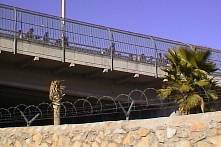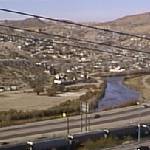Into the Night
It's 7:30, two nights before Christmas Eve, and it is cold in El Paso. I'm inside a U.S. Border Patrol truck, parked in a dirty, industrial, no man's land on the edge of town. I'm watching agent Jose Gonzales, who is outside, looking for somebody in a rugged vacant lot between the rescue mission and the brick factory. He is looking for two men who are cowering in the brush. Men who only moments ago were in a different country, who waded through freezing cold water to enter America, who crept under the cover of darkness across a canal, railroad tracks and an interstate highway to grab a piece of our standard of living -- to join in on the American dream. A campfire burns nearby, keeping some locals warm.
Chances are, these men don't know that they are being watched by a man in an office trailer a few miles away, by a man looking at the monitor of an infrared camera aimed at them, by a U.S. Border Patrol agent who is talking on radio right now to agent Gonzales.
"Keep going -- they are in a ravine about ten yards to your south."
Jose Gonzales has hunted many a man in his fourteen years on the Border Patrol, a job that has taken him through the dark underside of humanity. "I've seen people run over, I've seen people shot at, I've seen someone hit by a train... shot...stabbed...beaten -- you name it," he says. "I've seen kids who were so malnourished, they couldn't hold down a full meal."
But mostly, his job is a routine "catch and release" game of cat and mouse, and tonight, Gonzales is the cat, and the two Mexicans are mice in this game between two countries -- a game of politics, disparity, human rights and, as Gonzales puts it; "hunger and money."
Helicopters -- Used to survey wide open areas and to spot tracks in the sand. A pilot may fly low, blowing the sand and erasing tracks, so the next pass will reveal only fresh tracks.
The situation was a real mess until September 19, 1993, according to Gonzales, when they instituted "Hold the Line;" a program which put most of the agents right on the border. You can't take three steps along the river in El Paso now without seeing a Border Patrol agent, or one of them seeing you. "We lit it up and lined them up and started playing Red Rover," says Gonzales. Holding the line has greatly inhibited border crossing attempts and the rate of arrests has decreased from over a thousand a day, to only a few hundred.
Each afternoon, agents on the second shift roll out of the station in their Chevy Tahoes and Ford Explorers, like fishermen leaving the harbor. They steal into the night, trolling the American border for a catch of human cargo -- most of what they catch, they simply throw back in.
"93% of the people illegally crossing the border are back in Mexico in less than two hours," says Ramero Garcia, Public Information Officer for the El Paso Sector. This process is called a "Voluntary Return" and applies to Mexicans who cooperate with agents, have not committed a crime and who have no outstanding warrants. This can actually occur many times for a person -- there is no limit -- but if the person causes trouble, or smuggles someone over the border, he or she will have a hearing before a judge, which may lead to deportation. After a person is deported, entry into the U.S. is a felony.
But then, they may not do this, as it would just start a game of dodge ball for the rest of the night -- if someone is intent on entering the U.S., he will literally try to enter all night, and one time he may get through. So, indeed, sometimes an agent will hide and let subjects cross. Then he'll arrest them, and fill out the paperwork and send them back over the bridge. This at least takes them out of the game for a couple of hours and dampens their spirits.
Nearly all of the people El Paso Border Patrol agents deal with are docile. They know that they will not be harmed or detained for long, and if they don't cause trouble, they will simply get a slap on the wrist and be sent back over the bridge. If they do cause trouble, then they may be deported.
Here is an apparent contradiction: You would think that in the city, agents get a lot more drug activity than in the country. While many drugs do cross the border here, it is rare to find a large smuggling operation; if you have hundreds of pounds of drugs to smuggle, you would put it in a car or truck and sneak it through the desert -- you don't put it on your back and tote it through the city. So, while the agents here do catch a "mule" or two each night (a person with a large quantity of drugs on or inside of him) they are not routinely up against smugglers who have a lot to lose and who are willing to kill for it.
This is one of the reasons why Gonzales has put in for a transfer to Laredo, Texas. "That area is pretty heavy with drug traffic," he says. Even at 43, he has a lot of fight left in him and enjoys the chase. When a call comes in, he wrestles the Tahoe through the dirt toward the scene, floors it and turns up the radio -- not the 2-way, but the FM. "All my ex's drive a Lexus," he sings as we race along the railroad tracks. "I'm an old two-stepper from way back." he adds as we slip between an ugly bulldozer and a thirty-foot drop-off.
Married for twenty years, Gonzales has two teenage boys and is scheduling his retirement around their college plans and needs. He bought 8 acres in Bernie, Texas. "Maybe I'll open a little bed and breakfast," he says. "Or maybe board horses -- or both."
Though Border Patrol agents very seldom use their weapons, they train hard with them, for at any moment, there could be nothing else that will save their lives. Last year, an agent approached two men sitting on a bench. They looked a little suspicious, but not dangerous. One of the men pulled a gun and shot at the agent. Fortunately, the agent shot him before he got another round out. Gonzales has a Smith & Wesson 40 caliber on his side, with over three dozen rounds in three clips. I'm thankful he's a pretty big boy, because if bullets start flying, I'm hiding behind him.
So, Gonzales will ask the subject questions, like; "where were you born?" or "where do you live? On what street?" Many subjects will have practiced answers to these questions, and will claim they were born in El Paso, at the Thomson hospital, so Gonzales will press him harder; "What's the name of the store on your street?" or he'll trip them up with fake information; "yeah, you live right next to so-and-so." If the subject agrees, then Gonzales knows he's lying. Born in San Juan, Texas, Gonzales is full-blooded Mexican. "It's easier for us to tell when they're lying," he says.
U.S. Border Patrol agents have the authority to stop anybody they suspect. But they have to have a good reason for their suspicion. Much of their reasoning comes from intuition and experience, but they have to be able to articulate those gut feelings into reports, and sometimes in courtrooms.
Some things Gonzales looks for when eyeing a subject; Sneakers with slacks or nylon socks, dirty hair, a small backpack, durango boots (handmade work boots made in Mexico) and odd color shirts. Or he'll notice brand new clothes on a person who looks out of place in them, or someone who is nervous or lost and appears afraid to show it.
Flowing through El Paso, the Rio Grande looks more like a storm water spillway than a river. During the Carter era, Gonzales says, this part of the riverbed was lined with concrete, to stop erosion (they say.) But at the same time, a large fence was put up along the U.S. side. The fence, ten feet tall with a top portion curved toward Mexico and a lower portion reinforced with heavy steel fabric, is called the "Tortilla Curtain" perhaps because of the bend at its top. As we drive along the fence, we see several holes cut in it. "We fix those every day," says Gonzales. Some holes they leave open, so they know where the subjects will surface. We see a pair of trousers snagged at the top of the fence and wonder if the guy who lost them there was wearing underwear.
Most people crossing this border illegally are Mexicans, but more Central Americans are crossing, because of Hurricane Hugo, according to Gonzales. Once caught, these people can't simply be put back on the bridge and sent home. They must be detained until enough of them are caught for a U.S. flight to either their home country or sometimes the country of their latest visa.
Why do people cross the border? See
Despair of Disparity
"I can't blame them for trying -- I'd be trying the same thing if it meant feeding my family -- Mexico seems to be happy with the predicament they're in," Gonzales says of the country with very little middle class society. "It's the fault of the Mexican government for not taking care of their people."
Back to the chase along the railroad tracks. Though the agent watching the monitor can see the two men almost as clearly as if it were daytime, he cannot pinpoint where they are in relation to Gonzales, because the camera is far away and has a telephoto lens; it's like looking through a telescope -- your depth perception is rendered useless. So, even with our advanced technology, the men slip away amid the confusion of the campfire and the locals and the heavy terrain.
Around midnight, we sit on the river bank and watch activity across the river in Mexico. Buses roll by and pick up and drop off passengers. A woman holding a baby in a blanket is suspicious, two men waiting for a bus are suspicious -- everybody is suspicious, yet everybody is innocent. "It's kind of freaky, sometimes," says Gonzales. "I'm watching these people go about their daily lives, innocent of anything."
It is a very slow evening on the U.S. border tonight, with only 26 captures -- about one tenth the usual number -- blame it on the cold and the chilly waters of the Great River. Four young girls try to run across, but an agent shows his head and draws them back. Eight subjects, possibly "OTM" (other than Mexican) give it a try but recede when they see agents. Activity picks up around midnight when subjects know the agents are going into a shift change and don't want to get stuck in paperwork. Not that an agent would let anyone through, but the border crossers believe the agents make themselves more visible at this time.
Gonzales tells me of one of his more interesting encounters. In a brief incident wrought with lifelong consequences, A woman was so desperate to have her future child be a U.S. citizen, that she ran across the river to bear the child. Agents seized her and sent her back, even though her water had broken. Later that day, she crossed the river again, when Gonzales caught her. It was too late at this point and she had the baby right there, right in Gonzales's arms. As soon as the baby left her womb, he was a U.S. citizen. Waiting for the ambulance, Gonzales sat on the bank of the Rio Grande, in a peculiar situation; in his hands he held a U.S. citizen, still attached with an umbilical cord to his mother, a Mexican and an illegal alien.
It is the Great River, the Rio Grande, and every day, hundreds of people gaze across it and say; "If only I'd been born over there, I'd be an American." And every day, thousands of people put all their possessions on their backs and they jump into that river and they walk. And when they get halfway across, they are in America, and when they reach the other bank, their hearts pound with excitement -- they are in the promised land, the land of wealth and happiness. And if they don't get caught, they run. They run throughout the days and into the nights, and they run and run -- always a fugitive, always an illegal alien -- they run deeper into that darkness of anonymity, and they live in that night for as long as they can, because it is better than the bright, hot sun of Mexico.
|

The border, between Anapra, Mexico and Sunland, New Mexico, U.S.A..
Check out the
True America Tryouts Archives
Return to our
MAIN page


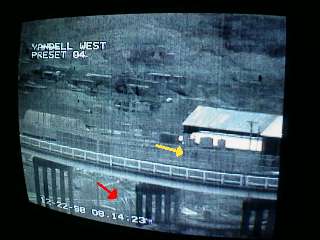

 Click image for a better view of this infrared camera scene.
Click image for a better view of this infrared camera scene.
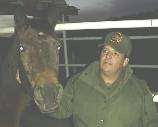 They still use horses to patrol the rugged border, and Gonzales takes me by the stables to see "Rooster" the horse he once rode. "A good horse can really help you -- he can smell a man a hundred yards away," says Gonzales. "I wish they'd use them more."
They still use horses to patrol the rugged border, and Gonzales takes me by the stables to see "Rooster" the horse he once rode. "A good horse can really help you -- he can smell a man a hundred yards away," says Gonzales. "I wish they'd use them more."
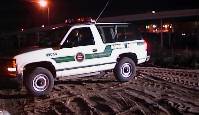 The first objective agents now have is to thwart border crossings. They park their trucks in clear sight of the Mexican river bank and make their presence known. If they see someone attempt to cross the river, they may attract their attention and send them back -- no harm, no foul.
The first objective agents now have is to thwart border crossings. They park their trucks in clear sight of the Mexican river bank and make their presence known. If they see someone attempt to cross the river, they may attract their attention and send them back -- no harm, no foul.
 Much of a U.S. Border Patrol agent's job is psychological. A subject may simply claim that he is an American, and an American has a great amount of freedom, including the freedom to not carry with him any identification at all. So the burden is on the agent to prove a person is not American, and this can be quite a burden if he is wrong.
Much of a U.S. Border Patrol agent's job is psychological. A subject may simply claim that he is an American, and an American has a great amount of freedom, including the freedom to not carry with him any identification at all. So the burden is on the agent to prove a person is not American, and this can be quite a burden if he is wrong.
